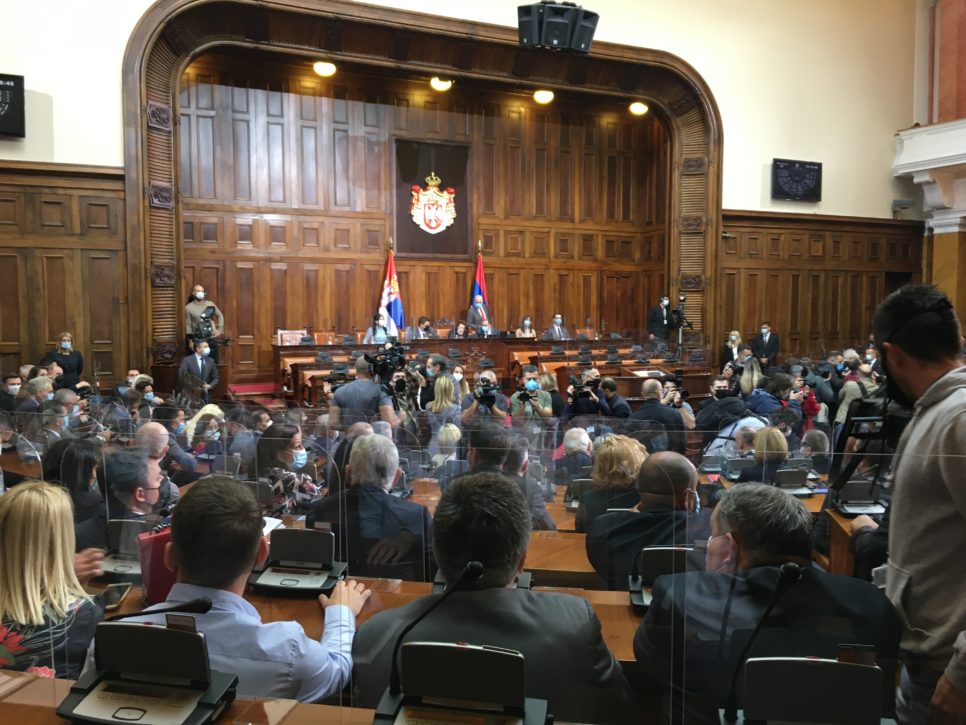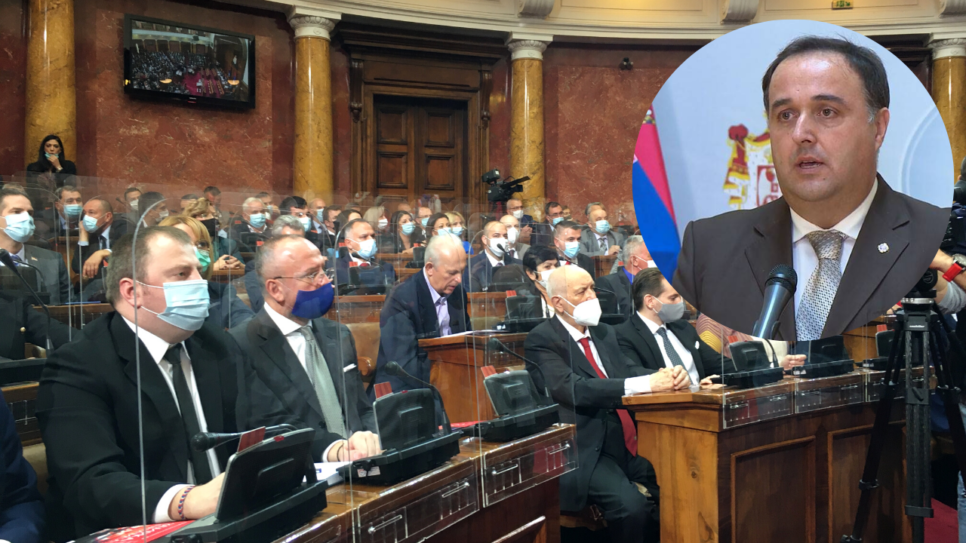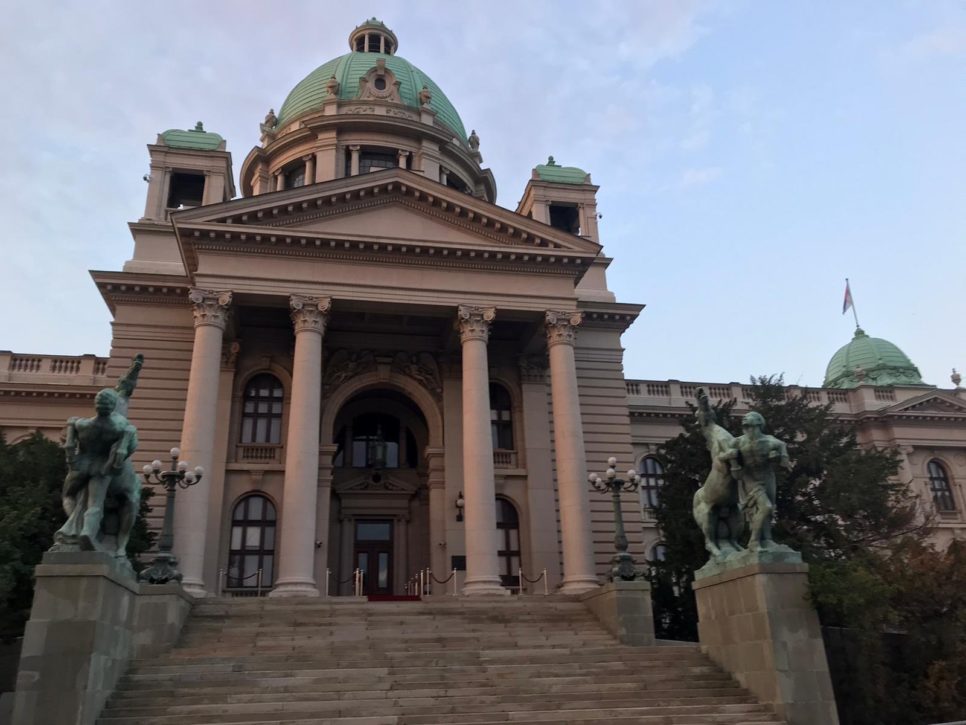Several hundred meters away from the National Assembly, in downtown Belgrade, is a three-room apartment owned by former Niš mayor and Democratic Party (DS) whip, Goran Ćirić. It took journalists of the Center for Investigative Journalism of Serbia (CINS) three minutes on foot to get from Ćirić’s apartment to the entrance to the National Assembly.
Although he has owned an apartment and garage near his workplace since 2008, according to research conducted by CINS, from early 2016 to late 2019 Ćirić collected just over 1.5 million dinars from the parliament because he had come to sessions driving his own vehicle. Ćirić also works as a special advisor at the Post of Serbia in Belgrade.
When asked on what grounds he had received money for fuel when he was living in the capital, Ćirić replied that he went to Niš “almost every weekend:”
“I live in Niš, in a family house, and I have an apartment in Belgrade. I have been traveling between Niš and Belgrade for twelve years for family reasons. I travel to Niš almost every weekend.”
He says that he sometimes heads south on workdays, too, but he does so in the evening so that he can return to Belgrade in the morning.
Ćirić further claims that he received money only for days when he traveled to Belgrade for sessions. However, based on that calculation, Ćirić was supposed to have taken money only occasionally; however, the data CINS obtained show that this MP attended at least 23 sessions of parliamentary committees over the course of one year and took money for 20 of them.
Official parliamentary documents show that from July to late October 2016 and from May to September 2017 this MP was on payment lists for coming to practically all the sessions and meetings of committees he had attended – including the Committee on Finance, State Budget and Control of Public Spending. Out of the three sessions for which Ćirić did not take money for fuel, he attended two without reimbursement, while for the third one he left the collection of fuel expenses to a female colleague from the party. Furthermore, Ćirić attended plenary sessions, for which his travel expenses were also covered.
After the CINS journalists asked him to comment on these findings, Ćirić stopped answering.
Besides Ćirić, Darko Laketić, an MP of the Serbian Progressive Party (SNS), has had a seat in parliament since 2014. Two years later he became assistant director of the Clinical Center Dr. Dragiša Mišović, and in December 2019 he replaced that job with the position of teaching assistant at Belgrade’s Faculty of Medicine.
Although Laketić has been working in Belgrade for a long time now, according to parliamentary records his place of residence is Prokuplje. He has no real estate in his name in the town, whereas he owns a 3.5-room apartment in Belgrade’s Vračar district, not far from Church of Saint Sava, as well as a small commercial venue in the same building. The Južne Vesti website in 2018 reported that Laketić was charging fuel for coming to the parliament, even though his fellow citizens claimed that he did not live in Prokuplje, while CINS’ database shows that he continued to travel in 2019 and that in the course of four years he received 2.9 million dinars on account of fuel expenses.
The CINS journalists were told twice at the Vračar address that Laketić was not there, while the neighbors we ran into confirmed that he and his wife lived there. In a conversation over the telephone, Laketić himself said that he was in Prokuplje, but declined to answer our questions. Laketić’s next-door neighbor in the town confirmed to us that the MP had been there for a while and that he came there often:
“He goes away for maybe two, three days, maybe five, it depends, but he’s here.”
Dragan Dobrašinović, president of the Coalition for Oversight of Public Finances NGO (Koalicija za nadzor javnih finansija), described the practice of MPs who have apartments in Belgrade taking money for fuel as “pathetic.”
“They are playing around, reporting what is more favorable for them based on their own interests, so that is certainly abuse. (…) They are (legally) allowed to do that, but by doing so they are practically cheating the competent bodies,” Dobrašinović told CINS.
According to a Decision of the Administrative Committee, the members of parliament who travel to Belgrade for sessions and other parliamentary obligations in their own car are entitled to reimbursement equaling 15 percent of the price of fuel per kilometer in both directions.
If a parliament session or work in parliamentary bodies take longer than a day, an MP may fully charge just one arrival in and departure from the capital, whereas for the other days they may collect money for traveling a distance of up to 125 kilometers from Belgrade (250 kilometers in both directions), which is an option MPs frequently use.
Enough Is Enough party (DJB) MP from Niš Miloš Bošković also used that option from June 2016 to March 2018. In cases of consecutive sessions, a colleague and he took money as if they were traveling, and then used it to rent an apartment in Belgrade.
They did not report this to the Assembly because then they would not have been able to travel home:
“It is a big problem when you take an apartment in Belgrade – you’re registered as being there the whole time and have no reimbursement for [travel] expenses for Niš. (…) Think about it, you have a wife and kids in Niš and now you’re going to go to Belgrade and they’re going to stay there. (…) Ultimately, this flexible option where you handle your own accommodation turns out to be the best.”
The MPs who used their own cars spent just under 290 million dinars on fuel in a four-year period.
The drastic increase in the price of gasoline in 2018, which sparked a drivers’ protest, also affected the amount citizens pay to MPs for transportation. Fuel expenses went up almost a third, and so around 60 million dinars was earmarked in the budget for fuel for MPs’ cars per year in 2016 and 2017, while in the next two years the amount was around 85 million.Gasoline price goes up, more money for MPs
“We are simply becoming immune to that phenomenon, while actually it’s those little things that best reveal the nature of the people in politics. (…) I think it is important that we as citizens understand that those travel expenses are not so high in total. (…) What, then, can someone who wants to do something honest and good for their city expect from an MP who builds their malfeasance on such small matters?”
Getting Money with Just a Statement
According to the parliament’s Information Booklet, MPs do not have to submit fuel receipts as evidence to confirm that they have traveled and from where. For example, if an MP who lives in Novi Sad comes to the Assembly from Pančevo one day, they can write that they are coming from their hometown and collect more money, without anyone checking whether they are telling the truth.
MPs prove how many kilometers they have traveled with only their signed statement.
“The members of parliament who arrive at sessions of the National Assembly and its working bodies in their own vehicle sign a statement confirming that they used their own vehicle to come to the session, including data on the vehicle’s license plates, travel route, number of kilometers traveled and the date on which a session of the National Assembly, i.e. a session of a working body was held,” according to the parliament’s website.
According to the data CINS received from the National Assembly, even the MPs who live in Baćevac, near Barajevo, and even in Belgrade’s municipality of Palilula have received a fee for their own transportation. However, they claim that the money was not for the trip home at all.
Ljubinko Rakonjac, an MP of the Greens of Serbia party (Zeleni Srbije) and head of the Institute of Forestry (Institut za šumarstvo), in 2017 took a loan and purchased a studio apartment near the Filmski Grad quarter, whereas he lives in the remote Belgrade suburb of Baćevac. According to CINS’ data, in 2018 and 2019 he received more than 90,000 dinars (for each year) for his own car expenses.
Even though the expenses are not high, Rakonjac told CINS that the money was not for trips home, but rather for sessions outside of Belgrade – for which they had even filled out travel order forms:
“That pertains to the expenses of holding sessions of parliamentary committees, which were held outside of Belgrade. An international organization, I think it’s UNDP, covers MPs’ expenses, when committee sessions are held in places other than Belgrade.”
Meho Omerović of the Social Democratic Party of Serbia (SDPS) resigned as MP in July 2018, after he was arrested at the Frankfurt airport for not having paid for cosmetics from the duty free shop. That year, but also the year before, Omerović collected roughly 50,000 dinars on account of using his own car, even though he lives in Belgrade’s municipality of Palilula. He told CINS that he had spent the fuel in question on a business trip in the country, which he had been reimbursed for under that item.
The National Assembly did not answer CINS' questions until this article was published about how that had happened, nor whether UNDP really did cover the cost of MPs’ transportation.
Then they file an order for collecting MP fees and, at the end of the month, the money is paid into their account.
Dragan Dobrašinović believes that these regulations should be changed:
“That regulation under which they do not have to show or prove anything, that was, I presume, copied from the laws or bylaws of some countries that care much more about morality. Where it is unthinkable for an MP to do something like that. (…) However, the state of affairs here is obviously different.”
Commenting on CINS’ findings that MPs from both the ruling bloc and the opposition act the same, Dobrašinović says that in such cases there is a consensus between parliamentary rivals:
“In such matters, when it’s about robbing the state, then there is a consensus. They have nothing against each other in such matters. Therefore, they all have their hands in the cookie jar. Even for that small amount. That is objectively little money relative to all the costs of state crime, corruption, malfeasance, abuse, that is little. But in a moral sense, it is no less problematic.”
The National Assembly did not answer the question of whether and how it checked MPs’ travels, by the time this article was published.
President of the Movement for the Restoration of the Kingdom of Serbia (POKS) Žika Gojković also took travel money. Being from Sombor, he collected 2.3 million dinars for fuel from 2016 to 2020. However, according to data from the Real Estate and Utility Cadastre, since 2018 Gojković has been the owner of a two-room apartment in Belgrade’s Voždovac district, not far from the Red Star football stadium. He explained to CINS that he had inherited the apartment from his aunt and uncle and that he went there only occasionally because he lived in Sombor with his family.
“I never moved to Belgrade, I have never taken a supplement for living away [from my family], I have not taken any privileges from the Assembly. I took the parliamentary car maybe 5-6 times, in 5-6 years.”
Serbian Progressive Party MP Ljubiša Stojmirović also owns an apartment in Belgrade, and has been living in the town of Crna Trava for a few years now. By the end of 2019, Stojmirović took 2.9 million dinars as fuel expense reimbursement.
The CINS journalists found him at his address in Belgrade’s Mirijevo quarter. He said that he had been traveling ever since he changed his place of residence during his term in office:
“I live in Crna Trava, but I have an apartment here, too. Sometimes I’m [in Belgrade] for a couple of days, sometimes I’m here for ten days or so.”
Mladen Jovanović believes that besides personalization of the electoral system, i.e. making a change where citizens would directly elect their representatives in the parliament, MPs should be obliged to spend a period of time working in Belgrade and another period working in the place they came from.
“For two weeks you are in your own town that elected you, for two weeks you are in the parliament. (…) Thus there is a very clear requirement of the MP job, when you are supposed to be where, and consequently the funds earmarked for travel expenses are known in advance. (…) Whereas here we have that system, in which who actually determines whether a trip was justified? No one. Only the MPs for themselves,” says Jovanović.
Made possible by support from the Dutch Ministry of Foreign Affairs

(Video in the story supported by Internews within Strengthening Independent Media in Europe and Eurasia (SIMEE) project.)





What do you think